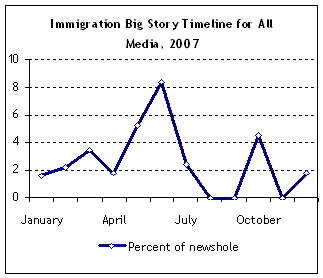In the past, televised news was seen primarily as a source of information, usually about politics and other recent events that could affect the audience. Now, however, this conception has become blurred with entertainment, as the evening news shows a much wider variety of stories. Many of the events that are now considered “newsworthy” are less substantial and more entertainment-based than earlier stories. Events such as immigration, which could fit under the traditional conception of news, are often pushed aside and covered only sporadically in favor of less serious stories that could interest a broader audience. This inconsistent coverage makes it difficult for viewers to fully understand immigration.

Even when more serious stories are discussed, television reporters often focus on the more entertaining, less political side of these issues. This trend can be seen as many news reports emphasize the personal side of immigration, telling listeners entertaining stories about illegal immigration rather than simply explaining recent events in Congress. The CNN report “Illegal Migrants Chase Wages” is an example of this, as the reporters focus not only on the actual problem, but also on the ways in which people were personally affected by it. Similarly, the report “Star Student is Undocumented” also follows this trend, as it discusses something that does not directly affect viewers, but that the audience might find interesting and entertaining.
These types of stories have much more entertainment value than a dull report about immigration reform recent bills presented in in Congress, thereby drawing in more viewers and increasing people’s awareness of this issue. Still, they also contribute to the inconsistency in television coverage of immigration, as they are primarily entertainment sources rather than informative reports. If televised news used these kinds of stories to catch people’s attention in addition to presenting relevant political information, the public would be much more knowledgeable about immigration as a whole.